- Home
- W. Somerset Maugham
Orientations
Orientations Read online
Orientations
W. Somerset Maugham
Orientations, by William Somerset Maugham
The Project Gutenberg EBook of Orientations, by William Somerset Maugham This eBook is for the use of anyone anywhere at no cost and with almost no restrictions whatsoever. You may copy it, give it away or re-use it under the terms of the Project Gutenberg License included with this eBook or online at www.gutenberg.org
Title: Orientations
Author: William Somerset Maugham
Release Date: February 17, 2010 [EBook #31308]
Language: English
Character set encoding: ISO-8859-1
*** START OF THIS PROJECT GUTENBERG EBOOK ORIENTATIONS ***
Produced by Chuck Greif and the Online Distributed Proofreading Team at http://www.pgdp.net (This file was produced from images generously made available by The Internet Archive)
GOOD WORDS LIST PROVIDE FOR SMOOTH READING REFERENCE ONLY:
parlour favours Ij sombre labourer realisation odour honour fulness commonweal bo Amyntas Becke Blackstable Castilian D'you d'you de Doña Farrowham Howlett lol Losas Lucido Monnickendam one's Ously Sodina Tercanbury Tiefel Whittington Xiormonez
ORIENTATIONS
NOVELS AT SIX SHILLINGS EACH
Uniform with this Volume
=An Outcast of the Islands.= By JOSEPH CONRAD. Second Edition. =Almayer's Folly.= By JOSEPH CONRAD. =The Ebbing of the Tide.= By LOUIS BECKE. =A First Fleet Family.= By LOUIS BECKE and WALTER JEFFERY. =Paddy's Woman.= By HUMPHREY JAMES. =Clara Hopgood.= By MARK RUTHERFORD. Second Edition. =The Tales of John Oliver Hobbes.= Portrait of the Author. Second Edition. =The Stickit Minister.= By S. R. CROCKETT. =The Lilac Sunbonnet.= By S. R. CROCKETT. =The Raiders.= By S. R. CROCKETT. =The Grey Man.= By S. R. CROCKETT. =In a Man's Mind.= By J. R. WATSON. =A Daughter of the Fen.= By J. T. BEALBY. =The Herb-Moon.= By JOHN OLIVER HOBBES. =Nancy Noon.= By BENJAMIN SWIFT. =Hugh Wynne.= By S. WEIR MITCHELL. =The Tormentor.= By BENJAMIN SWIFT. =The Mutineer.= By LOUIS BECKE and WALTER JEFFERY. =The Destroyer.= By BENJAMIN SWIFT. =The Gods, Some Mortals, and Lord Wickenham.= By JOHN OLIVER HOBBES. =Mrs Keith's Crime.= By Mrs W. K. CLIFFORD. =Prisoners of Conscience.= By AMELIA E. BARR. =Pacific Tales.= By LOUIS BECKE. =The People of Clopton.= By GEORGE BARTRAM. =Outlaws of the Marches.= By Lord ERNEST HAMILTON. =The Silver Christ.= Stories by OUIDA. =The White-Headed Boy.= By GEORGE BARTRAM. =Tales of Unrest.= By JOSEPH CONRAD. =The School for Saints.= By JOHN OLIVER HOBBES. =Evelyn Innes.= By GEORGE MOORE. =Rodman, the Boatsteerer.= By LOUIS BECKE. =The Romance of a Midshipman.= By W. CLARK RUSSELL. =The Making of a Saint.= By W. SOMERSET MAUGHAM. =The Two Standards.= By W. BARRY, D.D. =The Mawkin of the Flow.= By Lord ERNEST HAMILTON. =Love is not so Light.= By CONSTANCE COTTERELL. =Moonlight.= By MARY E. MANN. =I, Thou, and the Other One.= By AMELIA E. BARR.
* * * * *
London
T. FISHER UNWIN, Paternoster Square, E.C.
ORIENTATIONS
By William Somerset Maugham Author of 'Liza of Lambeth,' 'The Making of a Saint'
[Illustration]
London T. Fisher Unwin Paternoster Square 1899
[All Rights reserved]
TO MRS EDWARD JOHNSTON
CONTENTS
PAGE
THE PUNCTILIOUSNESS OF DON SEBASTIAN 3
A BAD EXAMPLE 37
DE AMICITIA 97
FAITH 133
THE CHOICE OF AMYNTAS 165
DAISY 219
C'est surtout, par ses nouvelles d'un jeune écrivain qu'on peut se rendre compte du tour de son esprit. Il y cherche la voie qui lui est propre dans une série d'essais de genre et de style différents, qui sont comme des orientations, pour trouver son moi littéraire.
Orientations
THE PUNCTILIOUSNESS OF DON SEBASTIAN
I
Xiormonez is the most inaccessible place in Spain. Only one train arrives there in the course of the day, and that arrives at two o'clock in the morning; only one train leaves it, and that starts an hour before sunrise. No one has ever been able to discover what happens to the railway officials during the intermediate one-and-twenty hours. A German painter I met there, who had come by the only train, and had been endeavouring for a fortnight to get up in time to go away, told me that he had frequently gone to the station in order to clear up the mystery, but had never been able to do so; yet, from his inquiries, he was inclined to suspect--that was as far as he would commit himself, being a cautious man--that they spent the time in eating garlic and smoking execrable cigarettes. The guide-books tell you that Xiormonez possesses the eyebrows of Joseph of Arimathea, a cathedral of the greatest quaintness, and battlements untouched since their erection in the fourteenth century. And they strongly advise you to visit it, but recommend you before doing so to add Keating's insect powder to your other toilet necessaries.
I was travelling to Madrid in an express train which had been rushing along at the pace of sixteen miles an hour, when suddenly it stopped. I leant out of the window, asking where we were.
'Xiormonez!' answered the guard.
'I thought we did not stop at Xiormonez.'
'We do not stop at Xiormonez,' he replied impassively.
'But we are stopping now!'
'That may be; but we are going on again.'
I had already learnt that it was folly to argue with a Spanish guard, and, drawing back my head, I sat down. But, looking at my watch, I saw that it was only ten. I should never again have a chance of inspecting the eyebrows of Joseph of Arimathea unless I chartered a special train, so, seizing the opportunity and my bag, I jumped out.
The only porter told me that everyone in Xiormonez was asleep at that hour, and recommended me to spend the night in the waiting-room, but I bribed him heavily; I offered him two pesetas, which is nearly fifteenpence, and, leaving the train to its own devices, he shouldered my bag and started off.
Along a stony road we walked into the dark night, the wind blowing cold and bitter, and the clouds chasing one another across the sky. In front, I could see nothing but the porter hurrying along, bent down under the weight of my bag, and the wind blew icily. I buttoned up my coat. And then I regretted the warmth of the carriage, the comfort of my corner and my rug; I wished I had peacefully continued my journey to Madrid--I was on the verge of turning back as I heard the whistling of the train. I hesitated, but the porter hurried on, and fearing to lose him in the night, I sprang forwards. Then the puffing of the engine, and on the smoke the bright reflection of the furnace, and the train steamed away; like Abd-er-Rahman, I felt that I had flung my scabbard into the flames.
Still the porter hurried on, bent down under the weight of my bag, and I saw no light in front of me to announce the approach to a town. On each side, bordering the road, were trees, and beyond them darkness. And great black clouds hastened after one another across the heavens. Then, as we walked along, we came to a rough stone cross, and lying on the steps before it was a woman with uplifted hands. And the wind blew bitter and keen, freezing the marrow of one's bones. What prayers had she to offer that she must kneel there alone in the night? We passed another cross standing up with its outstretched arms like a soul in pain. At last a heavier night rose before me, and presently I saw a great stone arch. Passing beneath it, I found myself immediately in the town.
The street was tortuous and narrow, paved with rough cobbles; and it rose steeply, so that the porter bent lower beneath his burden, panting. With the bag on his shoulders he looked like some hunchbacked gnome, a creature of nightmare. On either side rose tall houses, lying crooked and irregular, leaning towards one another at the top, so that one could not see the clouds, and their windows were great, black apertures like giant mouths. There was not a light, not a soul, not a sound--except that of my own feet and th
e heavy panting of the porter. We wound through the streets, round corners, through low arches, a long way up the steep cobbles, and suddenly down broken steps. They hurt my feet, and I stumbled and almost fell, but the hunchback walked along nimbly, hurrying ever. Then we came into an open space, and the wind caught us again, and blew through our clothes, so that I shrank up, shivering. And never a soul did we see as we walked on; it might have been a city of the dead. Then past a tall church: I saw a carved porch, and from the side grim devils grinning down upon me; the porter dived through an arch, and I groped my way along a narrow passage. At length he stopped, and with a sigh threw down the bag. He beat with his fists against an iron door, making the metal ring. A window above was thrown open, and a voice cried out. The porter answered; there was a clattering down the stairs, an unlocking, and the door was timidly held open, so that I saw a woman, with the light of her candle throwing a strange yellow glare on her face.
And so I arrived at the hotel of Xiormonez.
II
My night was troubled by the ghostly crying of the watchman: 'Protect us, Mary, Queen of Heaven; protect us, Mary!' Every hour it rang out stridently as soon as the heavy bells of the cathedral had ceased their clanging, and I thought of the woman kneeling at the cross, and wondered if her soul had found peace.
In the morning I threw open the windows and the sun came dancing in, flooding the room with gold. In front of me the great wall of the cathedral stood grim and grey, and the gargoyles looked savagely across the square.... The cathedral is admirable; when you enter you find yourself at once in darkness, and the air is heavy with incense; but, as your eyes become accustomed to the gloom, you see the black forms of penitents kneeling by pillars, looking towards an altar, and by the light of the painted windows a reredos, with the gaunt saints of an early painter, and aureoles shining dimly.
But the gem of the Cathedral of Xiormonez is the Chapel of the Duke de Losas, containing, as it does, the alabaster monument of Don Sebastian Emanuel de Mantona, Duque de Losas, and of the very illustrious Señora Doña Sodina de Berruguete, his wife. Like everything else in Spain, the chapel is kept locked up, and the guide-book tells you to apply to the porter at the palace of the present duke. I sent a little boy to fetch that worthy, who presently came back, announcing that the porter and his wife had gone into the country for the day, but that the duke was coming in person.
And immediately I saw walking towards me a little, dark man, wrapped up in a big capa, with the red and blue velvet of the lining flung gaudily over his shoulder. He bowed courteously as he approached, and I perceived that on the crown his hair was somewhat more than thin. I hesitated a little, rather awkwardly, for the guide-book said that the porter exacted a fee of one peseta for opening the chapel--one could scarcely offer sevenpence-halfpenny to a duke. But he quickly put an end to all doubt, for, as he unlocked the door, he turned to me and said,--
'The fee is one franc.'
As I gave it him he put it in his pocket and gravely handed me a little printed receipt. Baedeker had obligingly informed me that the Duchy of Losas was shorn of its splendour, but I had not understood that the present representative added to his income by exhibiting the bones of his ancestors at a franc a head....
We entered, and the duke pointed out the groining of the roof and the tracery of the windows.
'This chapel contains some of the finest Gothic in Spain,' he said.
When he considered that I had sufficiently admired the architecture, he turned to the pictures, and, with the fluency of a professional guide, gave me their subjects and the names of the artists.
'Now we come to the tombs of Don Sebastian, the first Duke of Losas, and his spouse, Doña Sodina--not, however, the first duchess.'
The monument stood in the middle of the chapel, covered with a great pall of red velvet, so that no economical tourist should see it through the bars of the gate and thus save his peseta. The duke removed the covering and watched me silently, a slight smile trembling below his little, black moustache.
The duke and his wife, who was not his duchess, lay side by side on a bed of carved alabaster; at the corners were four twisted pillars, covered with little leaves and flowers, and between them bas-reliefs representing Love, and Youth, and Strength, and Pleasure, as if, even in the midst of death, death must be forgotten. Don Sebastian was in full armour. His helmet was admirably carved with a representation of the battle between the Centaurs and the Lapithæ; on the right arm-piece were portrayed the adventures of Venus and Mars, on the left the emotions of Vulcan; but on the breast-plate was an elaborate Crucifixion, with soldiers and women and apostles. The visor was raised, and showed a stern, heavy face, with prominent cheek bones, sensual lips and a massive chin.
'It is very fine,' I remarked, thinking the duke expected some remark.
'People have thought so for three hundred years,' he replied gravely.
He pointed out to me the hands of Don Sebastian.
'The guide-books have said that they are the finest hands in Spain. Tourists especially admire the tendons and veins, which, as you perceive, stand out as in no human hand would be possible. They say it is the summit of art.'
And he took me to the other side of the monument, that I might look at Doña Sodina.
'They say she was the most beautiful woman of her day,' he said, 'but in that case the Castilian lady is the only thing in Spain which has not degenerated.'
She was, indeed, not beautiful: her face was fat and broad, like her husband's; a short, ungraceful nose, and a little, nobbly chin; a thick neck, set dumpily on her marble shoulders. One could not but hope that the artist had done her an injustice.
The Duke of Losas made me observe the dog which was lying at her feet.
'It is a symbol of fidelity,' he said.
'The guide-book told me she was chaste and faithful.'
'If she had been,' he replied, smiling, 'Don Sebastian would perhaps never have become Duque de Losas.'
'Really!'
'It is an old history which I discovered one day among some family papers.'
I pricked up my ears, and discreetly began to question him.
'Are you interested in old manuscripts?' said the duke. 'Come with me and I will show you what I have.'
With a flourish of the hand he waved me out of the chapel, and, having carefully locked the doors, accompanied me to his palace. He took me into a Gothic chamber, furnished with worn French furniture, the walls covered with cheap paper. Offering me a cigarette, he opened a drawer and produced a faded manuscript.
'This is the document in question,' he said. 'Those crooked and fantastic characters are terrible. I often wonder if the writers were able to read them.'
'You are fortunate to be the possessor of such things,' I remarked.
He shrugged his shoulders.
'What good are they? I would sooner have fifty pesetas than this musty parchment.'
An offer! I quickly reckoned it out into English money. He would doubtless have taken less, but I felt a certain delicacy in bargaining with a duke over his family secrets....
'Do you mean it? May I--er--'
He sprang towards me.
'Take it, my dear sir, take it. Shall I give you a receipt?'
And so, for thirty-one shillings and threepence, I obtained the only authentic account of how the frailty of the illustrious Señora Doña Sodina was indirectly the means of raising her husband to the highest dignities in Spain.
III
Don Sebastian and his wife had lived together for fifteen years, with the entirest happiness to themselves and the greatest admiration of their neighbours. People said that such an example of conjugal felicity was not often seen in those degenerate days, for even then they prated of the golden age of their grandfathers, lamenting their own decadence.... As behoved good Castilians, burdened with such a line of noble ancestors, the fortunate couple conducted themselves with all imaginable gravity. No strange eye was permitted to witness a caress between the lord a
nd his lady, or to hear an expression of endearment; but everyone could see the devotion of Don Sebastian, the look of adoration which filled his eyes when he gazed upon his wife. And people said that Doña Sodina was worthy of all his affection. They said that her virtue was only matched by her piety, and her piety was patent to the whole world, for every day she went to the cathedral at Xiormonez and remained long immersed in her devotions. Her charity was exemplary, and no beggar ever applied to her in vain.
But even if Don Sebastian and his wife had not possessed these conjugal virtues, they would have been in Xiormonez persons of note, since not only did they belong to an old and respected family, which was rich as well, but the gentleman's brother was archbishop of the See, who, when he graced the cathedral city with his presence, paid the greatest attention to Don Sebastian and Doña Sodina. Everyone said that the Archbishop Pablo would shortly become a cardinal, for he was a great favourite with the king, and with the latter His Holiness the Pope was then on terms of quite unusual friendship.
And in those days, when the priesthood was more noticeable for its gallantry than for its good works, it was refreshing to find so high-placed a dignitary of the Church a pattern of Christian virtues, who, notwithstanding his gorgeous habit of life, his retinue, his palaces, recalled, by his freedom from at least two of the seven deadly sins, the simplicity of the apostles, which the common people have often supposed the perfect state of the minister of God.
Don Sebastian had been affianced to Doña Sodina when he was a boy of ten, and before she could properly pronounce the viperish sibilants of her native tongue. When the lady attained her sixteenth year, the pair were solemnly espoused, and the young priest Pablo, the bridegroom's brother, assisted at the ceremony. In these days the union would have been instanced as a triumphant example of the success of the mariage de convenance, but at that time such arrangements were so usual that it never occurred to anyone to argue for or against them. Yet it was not customary for a young man of two-and-twenty to fall madly in love with the bride whom he saw for the first time a day or two before his marriage, and it was still less customary for the bride to give back an equal affection. For fifteen years the couple lived in harmony and contentment, with nothing to trouble the even tenor of their lives; and if there was a cloud in their sky, it was that a kindly Providence had vouchsafed no fruit to the union, notwithstanding the prayers and candles which Doña Sodina was known to have offered at the shrine of more than one saint in Spain who had made that kind of miracle particularly his own.

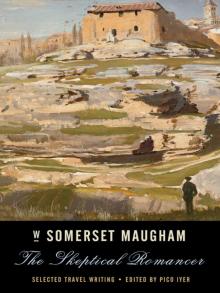 The Skeptical Romancer: Selected Travel Writing
The Skeptical Romancer: Selected Travel Writing The Summing Up
The Summing Up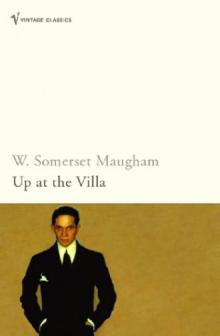 Up at the Villa
Up at the Villa The Razor's Edge
The Razor's Edge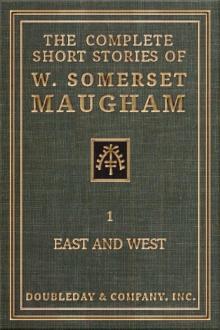 The Complete Short Stories of W. Somerset Maugham: East and West (Vol. 1 of 2))
The Complete Short Stories of W. Somerset Maugham: East and West (Vol. 1 of 2))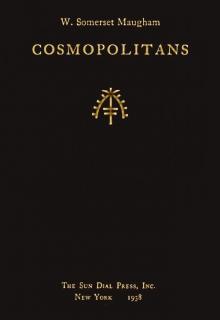 Cosmopolitans
Cosmopolitans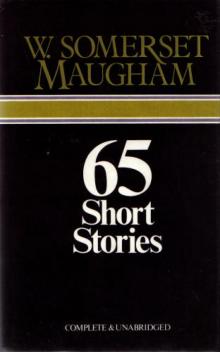 65 Short Stories
65 Short Stories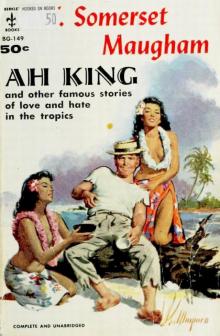 Ah King (Works of W. Somerset Maugham)
Ah King (Works of W. Somerset Maugham) Collected Short Stories: Volume 1
Collected Short Stories: Volume 1 Collected Short Stories Volume 2
Collected Short Stories Volume 2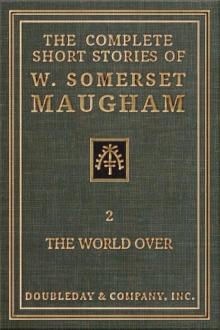 The Complete Short Stories of W. Somerset Maugham - II - The World Over
The Complete Short Stories of W. Somerset Maugham - II - The World Over Collected Short Stories Volume 4
Collected Short Stories Volume 4 Theatre
Theatre Short Stories
Short Stories Then and Now
Then and Now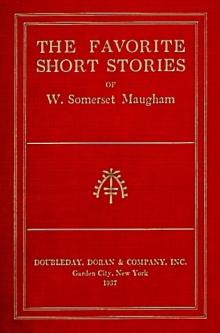 The Favorite Short Stories of W. Somerset Maugham
The Favorite Short Stories of W. Somerset Maugham Of Human Bondage
Of Human Bondage The Magician
The Magician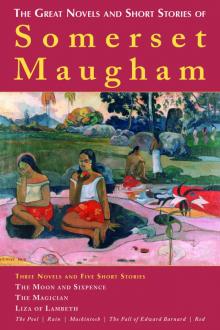 The Great Exotic Novels and Short Stories of Somerset Maugham
The Great Exotic Novels and Short Stories of Somerset Maugham A Writer's Notebook
A Writer's Notebook Christmas Holiday
Christmas Holiday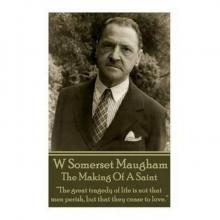 The Making of a Saint
The Making of a Saint Merry Go Round
Merry Go Round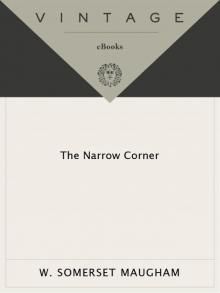 The Narrow Corner
The Narrow Corner Collected Short Stories Volume 3
Collected Short Stories Volume 3 Ten Novels and Their Authors
Ten Novels and Their Authors Ashenden
Ashenden The Moon and Sixpence
The Moon and Sixpence Cakes and Ale
Cakes and Ale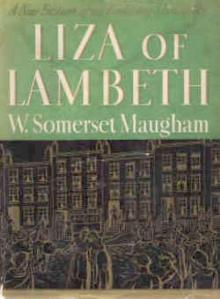 Liza of Lambeth
Liza of Lambeth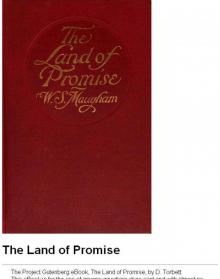 The Land of Promise: A Comedy in Four Acts (1922)
The Land of Promise: A Comedy in Four Acts (1922) A Writer's Notebook (Vintage International)
A Writer's Notebook (Vintage International)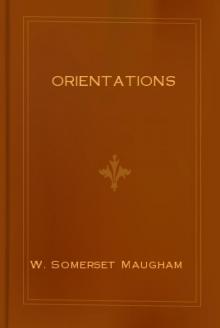 Orientations
Orientations Selected Masterpieces
Selected Masterpieces Mrs Craddock
Mrs Craddock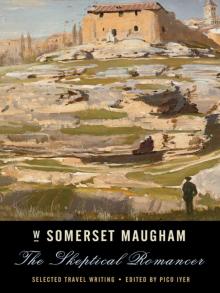 The Skeptical Romancer
The Skeptical Romancer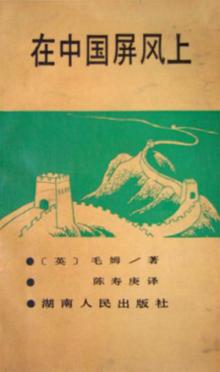 On a Chinese Screen
On a Chinese Screen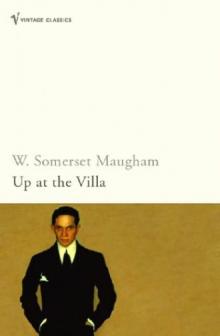 (1941) Up at the Villa
(1941) Up at the Villa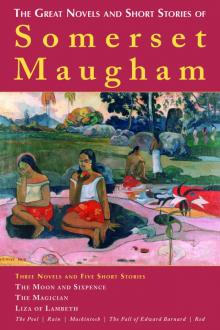 The Great Novels and Short Stories of Somerset Maugham
The Great Novels and Short Stories of Somerset Maugham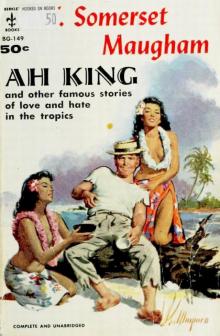 Ah King
Ah King The Explorer
The Explorer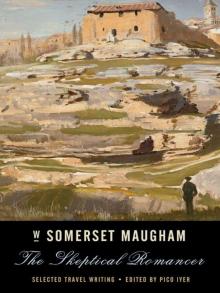 The Skeptical Romancer: Selected Travel Writing (Vintage Departures)
The Skeptical Romancer: Selected Travel Writing (Vintage Departures)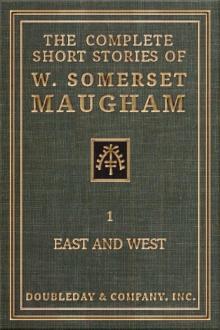 The Complete Short Stories of W. Somerset Maugham - I - East and West
The Complete Short Stories of W. Somerset Maugham - I - East and West